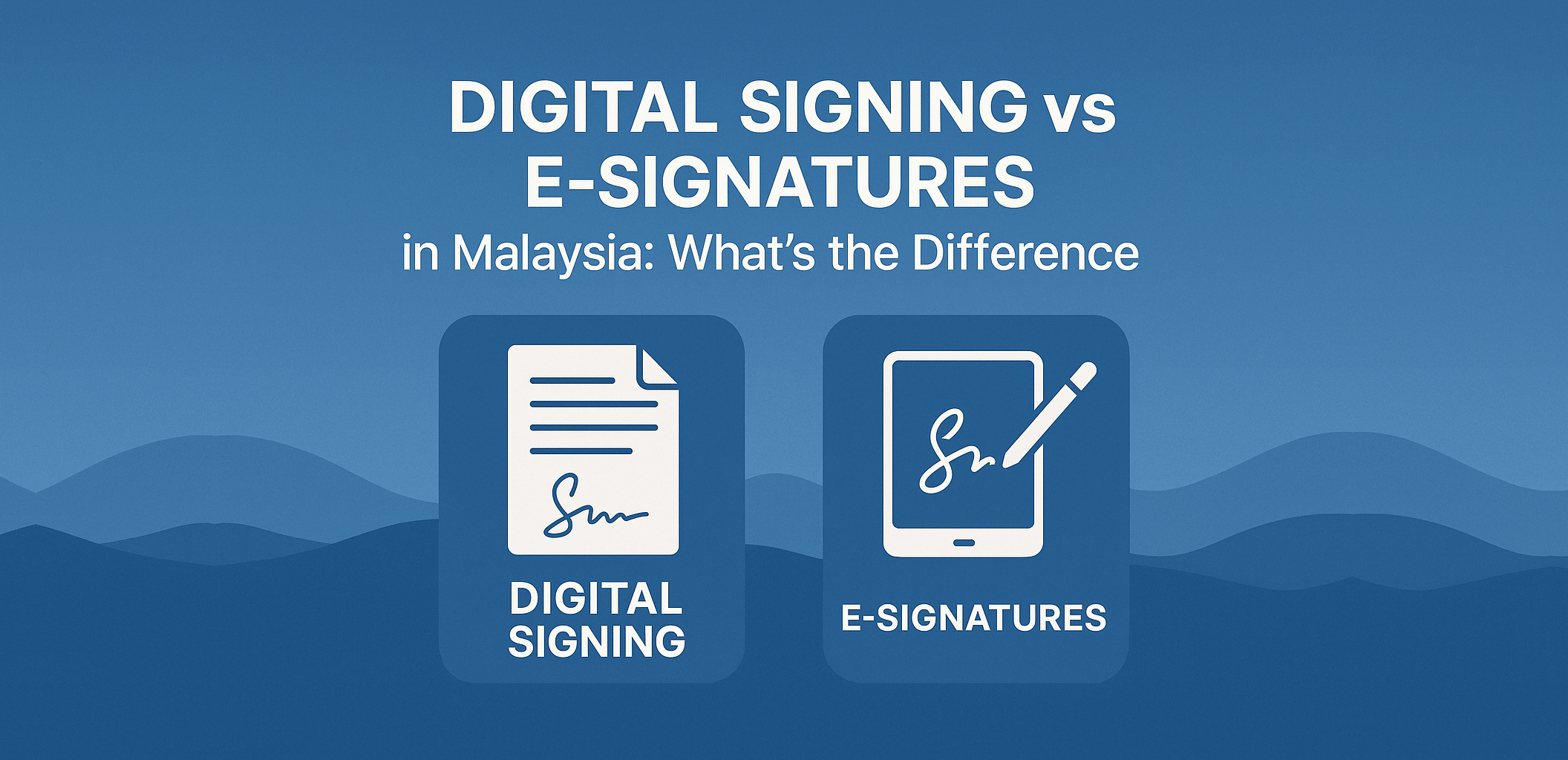Digital Signing vs e-Signatures in Malaysia: What’s the Difference—and When to Use Which

Many people use “e-signature” and “digital signature” interchangeably. In Malaysia, they’re not the same. Understanding the difference matters—from tenants signing a Tenancy Agreement (TA) to lawyers finalising a Sale & Purchase Agreement (SPA).
1) The Core Difference: Security & the Law
A) e-Signature (Electronic Signature) — ECA 2006
| Feature | Description |
|---|---|
| What it is | Any electronic method showing a person’s intent to sign. |
| Examples | Typing your name, ticking “I agree”, drawing a signature, inserting a signature image. |
| Legal status | Recognised for most commercial contracts if it can identify the signer, indicate approval, and is appropriate & reliable for the purpose. |
| Security level | Lower. Easier to challenge (identity/alteration disputes) unless there’s a strong audit trail. |
B) Digital Signature (PKI) — DSA 1997
| Feature | Description |
|---|---|
| What it is | A cryptographic (PKI) signature bound to a digital certificate issued by a licensed Certification Authority (CA) in Malaysia. |
| Examples | CA-backed signing platforms with KYC / identity verification and certificate issuance. |
| Legal status | Higher assurance of identity & document integrity; strong non-repudiation within a regulated trust framework. |
| Security level | Higher. Tamper-evident, identity-bound, and significantly harder to challenge. |
2) Why People Say “e-Sign Isn’t Powerful Enough”
Simple e-sign: If someone later claims, “that wasn’t me” or “someone clicked for me,” proving identity and integrity can be harder—especially without robust logs.
Digital signature: The certificate is tied to a verified identity (often with OTP/PIN and KYC), and the platform preserves an audit trail—making repudiation far harder.
3) Practical Guide: When to Use Which (Malaysia)
Use Case 1 — Low-stakes commercial docs
- Offer letters, LOIs, vendor forms, internal HR docs
- Recommendation: e-Sign is usually fine.
- Why: Fast, practical, and recognised when the method is appropriate & reliable (keep a clear audit trail).
Use Case 2 — Tenancy Agreements (TA)
- Residential & commercial
- Recommendation: Prefer Digital Signature (PKI).
- Why: It’s a longer-term financial commitment; PKI gives stronger identity assurance and tamper-evidence. Many platforms run KYC and keep comprehensive audit logs. (Confirm landlord/agent policy.)
Use Case 3 — High-stakes property & land dealings
- SPA and registrable instruments under the National Land Code (NLC)
- Recommendation: Wet-ink signature with witness.
- Why: Land instruments have prescribed forms and attestation rules. In practice, registries, banks, and developers still overwhelmingly require wet-ink + witnessing. (Only deviate if the specific land office/bank/developer has formally accepted a compliant digital workflow.)
- Note: Some remote/virtual witnessing guidance exists for certain documents. Always confirm the exact requirement of the relevant land office, bank, and developer before using anything other than wet-ink for registrable instruments.
4) Quick Decision Checklist (Malaysia)
| Scenario | Recommended Method |
|---|---|
| Law/registry requires a prescribed form or witnessing (e.g., SPA, transfer/charge) | Wet-ink with witness (follow Bar guidance if remote witnessing is allowed) |
| High identity assurance & non-repudiation needed (money at stake, long term, financing) | Digital Signature (PKI, licensed CA) |
| Low-risk commercial doc where speed matters | e-Sign (ensure clear audit trail & reliability) |
5) Important Carve-Outs & Limitations
A simple e-signature is typically not suitable (or expressly excluded) for documents that require special formality, including for example:
- Certain wills and codicils
- Powers of attorney
- Negotiable instruments (e.g., bills of exchange)
- Statutory declarations
- Know your document class before choosing a method.
Final Takeaway
The Electronic Commerce Act prevents a document from being rejected just because it’s electronic. But disputes usually turn on identity, intent, reliability, and whether formalities were required.
For valuable or long-term agreements, a DSA-compliant digital signature (licensed CA, proper ID checks, strong audit trail) reduces the attack surface and makes “the e-sign isn’t valid” arguments far less persuasive. For SPA/land instruments, stick to wet-ink with witness unless the relevant authorities formally accept a compliant digital process.
Non-Legal Advice Disclaimer
This article provides general information based on Malaysian practice. Requirements vary by document type, counterparty (bank/developer), and registry. Always consult your solicitor before selecting a signing method for important transactions.











































































































